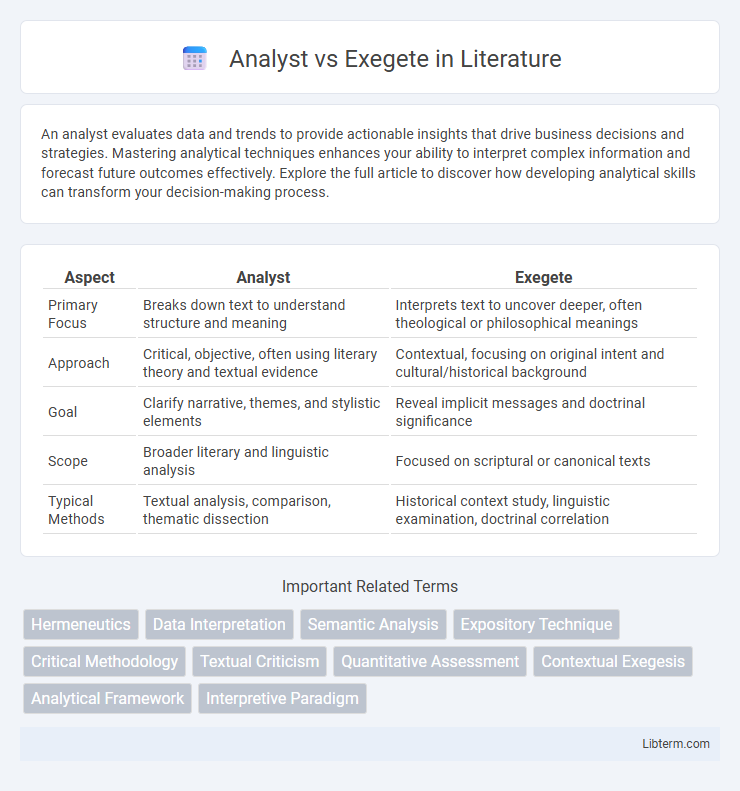An analyst evaluates data and trends to provide actionable insights that drive business decisions and strategies. Mastering analytical techniques enhances your ability to interpret complex information and forecast future outcomes effectively. Explore the full article to discover how developing analytical skills can transform your decision-making process.
Table of Comparison
| Aspect | Analyst | Exegete |
|---|---|---|
| Primary Focus | Breaks down text to understand structure and meaning | Interprets text to uncover deeper, often theological or philosophical meanings |
| Approach | Critical, objective, often using literary theory and textual evidence | Contextual, focusing on original intent and cultural/historical background |
| Goal | Clarify narrative, themes, and stylistic elements | Reveal implicit messages and doctrinal significance |
| Scope | Broader literary and linguistic analysis | Focused on scriptural or canonical texts |
| Typical Methods | Textual analysis, comparison, thematic dissection | Historical context study, linguistic examination, doctrinal correlation |
Defining the Analyst and the Exegete
An analyst systematically examines data or texts to identify patterns, trends, and meanings based on empirical evidence or logical reasoning. An exegete specializes in interpreting complex texts, particularly religious or philosophical writings, to uncover underlying intentions, contextual significance, and doctrinal insights. Both roles require critical thinking but differ in scope: analysts emphasize objective evaluation, while exegetes focus on interpretive understanding within textual traditions.
Core Competencies: Analyst vs Exegete
Analysts excel in data interpretation, pattern recognition, and decision-making based on quantitative insights, utilizing skills in statistical analysis, critical thinking, and problem-solving. Exegetes specialize in textual analysis, contextual interpretation, and extraction of meaning from complex documents, relying on deep knowledge of linguistics, historical context, and hermeneutics. Core competencies of analysts emphasize numerical data and trend evaluation, while exegetes focus on semantic understanding and contextual exegesis.
Methodological Approaches Compared
Analysts prioritize quantitative data, employing statistical models and computational techniques to identify patterns and forecast trends within datasets. Exegetes focus on interpretive methodologies, emphasizing contextual analysis and hermeneutics to uncover meaning from texts, especially in religious or literary works. While analysts utilize empirical, data-driven approaches, exegetes rely on critical theory and historical context to derive nuanced understanding.
Data Interpretation Styles
Analysts interpret data by focusing on quantitative metrics, statistical trends, and empirical evidence to derive actionable insights, often utilizing tools like data visualization and predictive modeling. Exegetes prioritize contextual and textual analysis, interpreting data through a detailed examination of language, symbolism, and historical background to uncover deeper meaning. While analysts emphasize objective measurement, exegetes seek subjective understanding, making their data interpretation styles complementary in comprehensive research.
Applications in Various Fields
Analysts interpret data and trends to drive decision-making in fields like finance, marketing, and technology by identifying patterns and forecasting outcomes. Exegetes specialize in critical interpretation of texts, commonly applied in theology, literature, and legal studies to uncover deeper meanings and contextual insights. Both roles enhance understanding but differ as analysts prioritize quantitative analysis while exegetes focus on qualitative textual exegesis.
Tools and Techniques Utilized
Analysts employ quantitative tools such as statistical software, data visualization platforms, and predictive modeling techniques to interpret structured data and generate actionable insights. Exegetes utilize hermeneutic methods, critical theory approaches, and contextual analysis to interpret and elucidate texts, often engaging with linguistic, historical, and cultural frameworks. While analysts prioritize empirical data and algorithmic processes, exegetes focus on subjective interpretation and nuanced understanding within textual or philosophical domains.
Strengths and Limitations
Analysts excel in breaking down complex data into patterns and insights, leveraging quantitative methods and critical thinking to support decision-making, but may overlook contextual or cultural nuances. Exegetes specialize in interpreting texts with deep understanding of historical, linguistic, and cultural backgrounds, offering rich contextual insights while sometimes lacking in empirical data analysis capabilities. Both roles complement each other by balancing analytical precision with interpretive depth, though each faces limitations in areas outside their expertise.
Collaboration and Integration
Analysts and exegetes collaborate by combining data-driven insights with deep textual interpretation to enhance understanding and decision-making. Integration of analytical methods with exegetical precision allows for comprehensive exploration of complex information, facilitating richer contextual awareness. Their collaboration maximizes accuracy and depth by blending quantitative analysis with qualitative evaluation in research and problem-solving environments.
Real-World Examples
Analysts dissect data and trends to inform business decisions, such as market analysts evaluating consumer behavior to optimize product launches. Exegetes interpret complex texts, notably in theology, exemplified by biblical exegetes unraveling scriptural meanings to guide religious teachings. Real-world scenarios show analysts driving corporate strategy while exegetes deepen understanding of foundational texts.
Choosing the Right Approach
Choosing the right approach between an analyst and an exegete depends on the objective of the study; analysts focus on data-driven evaluation and identifying patterns, while exegetes emphasize interpreting texts within historical and cultural contexts. Analysts utilize quantitative methods and statistical tools to derive insights, whereas exegetes apply hermeneutical techniques to uncover deeper meanings and intentions. Selecting the appropriate methodology ensures accurate conclusions, aligning with either empirical evidence or informed textual interpretation.
Analyst Infographic

 libterm.com
libterm.com